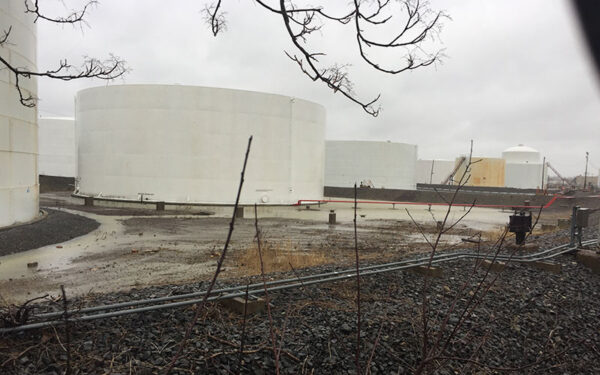
We need your help to achieve our 2022 resolution: strong, enforceable climate laws in every New England state. Photo: Shutterstock.
We all know the plight of new year’s resolutions. And now that we’re in March, most of our resolutions are probably long gone. As I write this blog, I fantasize about my commitment to a more consistent sleep schedule, a set number of books to read per month – even trying to get outdoors more. Resolutions that maybe lasted a week (at most).
Even though I quickly bid adieu to this alternate-reality Rishya in my personal life, when it comes to my work at CLF, I’m standing firm. My CLF colleagues and I have held steadfast to one resolution in particular: to make sure that each state has concrete plans to enact their climate laws that mandate cuts to polluting emissions.
We’re thrilled for what climate action looks like here in New England. And you can help. Join us in reflecting on everything we’ve achieved, what comes next in the five states with climate laws on the books, and how you can support our fight for a safe and healthy New England.
Connecticut
Where things stand: Connecticut’s Global Warming Solutions act mandates an 80% cut in climate-damaging emissions by 2050. In 2021, the Governor’s Council on Climate Change recommended actions to meet this target. Unfortunately, Connecticut didn’t make much progress on implementing these actions during last year’s legislative session. And the state’s annual Greenhouse Gas Inventory (a report that measures polluting emissions) showed that Connecticut isn’t on track to reach its climate goals. To get Connecticut on the right path, Governor Lamont issued an Executive Order on climate that included many of the Council’s recommendations.
What’s next: These lags in meeting the state’s climate targets are why 2022 is so important for Connecticut. This year’s legislative session starts on February 9, and we’re expecting several important climate bills. These bills will likely include efforts to strengthen the state’s climate law, implement its goals, and other strategies to reduce climate-warming emissions from transportation specifically.
How you can help: You can support these bills by telling your elected representatives how important climate action is to you. You could even testify during legislative hearings in favor of climate bills.
Maine
Where things stand: Maine’s climate law mandates an 80% cut in climate-damaging emissions by 2050. In 2021, we saw progress towards meeting this target in key areas, including a 90% increase in electric vehicle ownership since 2019. What’s more, 40,000 heat pumps have been installed – to replace oil and gas heating – putting the state well on its way toward meeting its goal of 100,000 heat pump installations by 2025.
Despite this progress, it’s unclear whether Maine is actually on track to meet its ultimate goal, including interim targets in 2025 and 2030, let alone Governor Mills’ goal for the state to be carbon neutral by 2045. Not to mention, the state Department of Environmental Protection was supposed to implement regulations to get the state on the right path to those targets by the end of last year, but failed to do so.
What’s next: In the coming year, we’ll continue pushing for more comprehensive implementation of Maine’s climate law, with a focus on cutting emissions from transportation and buildings. We’ll also hone in on how to do that equitably. And we’re expecting an updated three-year plan on how to implement various components of the climate law, like energy efficiency and electric vehicles.
How you can help: We anticipate opportunities for you to use your voice in support of various bills, policies, and goals that come up throughout 2022.
Massachusetts
Where things stand: In 2021, Massachusetts passed the first major update to its Global Warming Solutions Act since 2008. The Next Generation Roadmap Law raised the state’s climate goal to net zero by 2050. It also codified an environmental justice law that, for the first time, requires the State to consider environmental harms already affecting historically marginalized communities and avoid adding to those burdens. The law focuses on communities of color and those with low incomes and/or limited proficiency in English.
What’s next: This year, we’re expecting the State to release the final Clean Energy and Climate Plans for 2025 and 2030. These plans are intended to guide Massachusetts in meeting the targets detailed in the updated Global Warming Solutions Act.
How you can help: We expect the State to hold public meetings in late winter. You can attend to bolster clean energy solutions.
Rhode Island
Where things stand: In 2021, Rhode Island passed Act on Climate, a law that updates the state’s climate targets to require net zero emissions by 2050. A climate council – comprised of state agencies in charge of implementing Act on Climate – has started to revise the modest 2016 Greenhouse Gas Emissions Reduction Plan, and the revision is due at the end of 2022. CLF and our allies have urged the McKee administration to build into the Plan its strategy for cutting emissions by 2030 and 2050.
What’s next: In this year’s legislative session, we’ll be advocating for critical legislation to achieve the climate law’s targets.
How you can help: You can get involved by reaching out to your elected officials and letting them know you support climate legislation, or by submitting written or oral testimony directly to the legislature. And, as the Council works on updating the Greenhouse Gas Emissions Reduction Plan, we expect several opportunities for you to provide input to guide the process.
Vermont
Where things stand: After Vermont passed its Global Warming Solutions Act, mandating an 80% cut in climate-damaging emissions by 2050, the State convened a Climate Council to create a Climate Action Plan and implement the law. The Council launched a preliminary plan in December, proposing strategies to reduce carbon pollution from the state’s buildings, electricity, transportation, industrial, and agricultural sectors.
What’s next: In 2022, the Council will revise portions of the plan, specifically transportation and biomass electricity generation. The Agency of Natural Resources will also amend how we measure climate-damaging emissions in Vermont. And, the state legislature will introduce various bills to implement aspects of the Climate Action Plan. The Scott administration has signaled it is willing to potentially create rules to implement the plan as well.
How you can help: For the Climate Action Plan revisions, you’ll be able to send written comments or voice your opinion during Climate Council meetings. You can also support climate legislation by calling, emailing, or writing to your legislators.
We’re Going to Keep Fighting for Strong Climate Laws
That’s our goal in the Clean Energy and Climate Change Program. Because to achieve the safe and healthy future we envision, that we deserve, we need mandatory and enforceable cuts to climate-damaging emissions at the root of our climate crisis. We can’t push for this change without you. Sign up for our e-action alerts to support climate action with us.
So wherever your resolutions are three months into 2022, we need your help standing up for a healthy climate, for the sake of our communities and the world around us.



